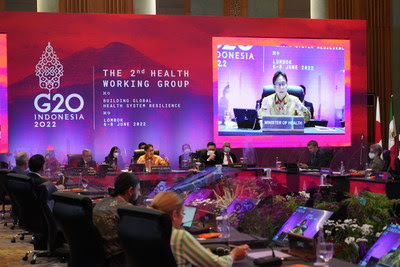ChartWater’s AdEdge Center of Excellence and Calgon Carbon signed an agreement to partner in offering drinking water treatment systems to under-resourced, rural communities.
Pittsburgh, Pennsylvania, June 09, 2022 (GLOBE NEWSWIRE) — ChartWater™ a division of Chart Industries, Inc. (“Chart”) (NYSE: GTLS), and Calgon Carbon Corporation (“Calgon Carbon”), a wholly owned subsidiary of Kuraray Co., Ltd. (TYO: 3405) (“Kuraray”), today formally announced an agreement signed in 2021 to jointly offer drinking water systems, using granular activated carbon, to under-resourced rural areas.
The terms of the Agreement allow Calgon Carbon to refer all communities in the United States requiring treatment of up to approximately 175 gallons per minute to ChartWater’s AdEdge Water Technologies (AdEdge ), who will source all related GAC from Calgon Carbon. While both companies will continue to provide water treatment solutions for all flow rates, the Agreement enables the Companies to combine their capabilities for solutions that will cost-effectively provide safe drinking water to communities.
According to the U.S. EPA’s Safe Drinking Water Act, there are over 140,000 small drinking water systems in the United States. Many of these systems face challenges in meeting ever-changing and stringent regulations around drinking water contamination, making it difficult to provide consistently safe drinking water to customers. The new Agreement offers these small systems access to AdEdge’s variety of equipment offerings as well as Calgon Carbon’s premium product line, FILTRASORB® GAC.
“We are excited to partner with Calgon Carbon to combine their decades of GAC experience with our experience providing complete, packaged treatment systems to municipalities around the United States,” said Chris Milligan, President of ChartWater™. “ChartWater’s AdEdge Center of Excellence provides solutions for municipal and industrial customers of all sizes. This relationship with Calgon Carbon will specifically strengthen our ability to serve smaller utilities with a world-class GAC solution for the removal of PFAS, TOC, disinfection byproducts, and any other contaminants that can be addressed with GAC.”
Since creating the first activated carbon products from bituminous coal in the 1940s, Calgon Carbon has been a pioneer in developing high performing granular activated carbon products for water purification.
“Calgon Carbon has provided GAC to hundreds of water suppliers for over 40 years, and we are enthusiastic about this Agreement,” said Nora Stockhausen, VP of the Drinking Water Solutions and Innovative Carbon Technologies business unit. “This collaboration allows our FILTRASORB® GAC to be more accessible to smaller utilities through AdEdge’s reach in this market and we’re proud to work together to provide clean, safe drinking water to more Americans.”
About Chart Industries, Inc.
Chart Industries, Inc. is a leading independent global manufacturer of highly engineered equipment servicing multiple applications in the Energy and Industrial Gas markets. Our unique product portfolio is used in every phase of the liquid gas supply chain, including upfront engineering, service and repair. Being at the forefront of the clean energy transition, Chart is a leading provider of technology, equipment and services related to liquefied natural gas, hydrogen, biogas and CO2 Capture amongst other applications. We are committed to excellence in environmental, social and corporate governance (ESG) issues both for our company as well as our customers. With over 25 global locations from the United States to Asia, Australia, India, Europe and South America, we maintain accountability and transparency to our team members, suppliers, customers and communities. To learn more, visit www.chartindustries.com.
About ChartWaterTM
ChartWater™, a division of Chart Industries, is a global manufacturer and service provider of engineered solutions for municipal water treatment and industrial process applications. Its portfolio of proven products, processes, and engineering expertise provides customers with single-point responsibility for complete solutions that enable water professionals to achieve their objectives with the lowest combination of risk and costs while driving enhanced outcomes for people, communities, and the planet. For more information, visit www.chartindustries.com/
About AdEdge Water Technologies
Founded in 2002 and headquartered just north of Atlanta, Georgia, USA, AdEdge Water Technologies, LLC is a leading provider of advanced water treatment technologies and systems serving municipal, residential and industrial applications nationally and overseas for flow rates up to 15 MGD. AdEdge manufacturers fully integrated and custom water treatment systems to remove over twenty different contaminants from water, including arsenic, iron, manganese, fluoride, PFAS, TOC, and radionuclides. AdEdge also offers an ultra-high recovery reverse osmosis membrane solution for removal of TDS and multiple contaminants, using ROTEC’s Flow Reversal Reverse Osmosis. AdEdge was acquired by Chart Industries in August of 2021 as a ChartWater Center of Excellence. For more information, visit www.adedgetech.com.
About Calgon Carbon
Calgon Carbon, a wholly-owned subsidiary of Kuraray Co., Ltd. (TYO: 3405) (Kuraray), is a global leader in the manufacture and/or distribution of innovative coal-, wood- and coconut-based activated carbon products – in granular, powdered, pelletized and cloth form – to meet the most challenging purification demands of customers throughout the world. Calgon Carbon provides purification solutions for more than 700 distinct applications, including drinking water, wastewater, pollution abatement, and a variety of industrial and commercial manufacturing processes. Headquartered in Pittsburgh, Pennsylvania, Calgon Carbon employs approximately 1640 people and operates 20 manufacturing, reactivation, innovation and equipment fabrication facilities in the U.S., Asia, and in Europe, where Calgon Carbon is known as Chemviron. Calgon Carbon was acquired by Kuraray in March of 2018. With complementary products and services, the combined organization will continue to focus on providing the highest quality and most innovative activated carbon and filtration media products, equipment, and services to meet 
Amanda Lofty Calgon Carbon Corporation 724-541-2658 amanda.lofty@kuraray.com

